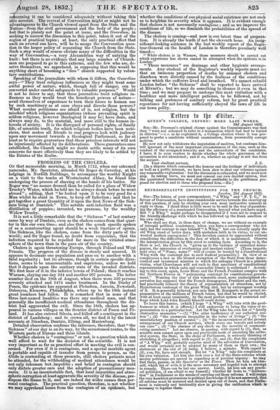PROGRESS OF THE CHOLERA.
ON that memorable morning, in March 1712, when our esteemed namesake, Mr. Spectator, attended Sir Roger de Coverley, at his lodgings in Norfolk Buildings, to accompany the worthy Knight on a visit to the tombs at Westminster Abbey, he found him undergoing the process of shaving at the hands of his butler. Sir Roger was "no sooner dressed than he called for a glass of Widow Trueby's Water, which he told me he always drank before he went abroad" • adding, that "he looked upon it to be very good for a Man whilst he staid in Town, to keep off Infection ; and that he got together a great Quantity of it upon the first News of the Sick- ness being at Dantziok." This notable anti-infection fluid was a distillation of poppies ; invented, we presume, by the wealthy Widow Trueby.
It is not a little remarkable that the " Sickness " of last century
came by way of Dantzic, even as the cholera comes from that quar- ter in this our own time ; and also that the quack specific spoken of as a counteracting agent should be a weak tincture of opium. The Sickness, like the cholera, came from the dirty parts of the world; and Sir Roger found, no doubt from experience, that the infection required to be repelled far more in the vitiated atmo- sphere of the town than in the pure air of the country.
Cholera is again threatening Europe, through Poland and West Prussia. The progress of the disease is steady and assured. It appears to decimate one population and pass on to another with a fatal regularity ; but its advance, though in certain specific direc- tions, seems to be unaccountable and capricious, unless we hold that it depends upon the sanitary state of the invaded districts. We first hear of it in the inferior towns of Poland; then it reaches Warsaw, slaying one day 244 and another 207 persons. The latter number died on the 18th of August, when there were 550 persons severely attacked and 1474 under treatment. In the Duchy of Posen, the epidemic has appeared at Pletschen, jarocin, Newstadt, Dobrzyca, Klonowo, Philadelphia, where up to the 18th instant great numbers had fallen. It is remarked that in none of the three last-named localities was there any medical man, and that generally the insufficient medical attendance throughout the dis- trict had aggravated the evil. Since the 18th, cholera has ap- peared in various villages on the frontier district of Posen and Po- land. It has also entered Silesia, and killed off a contingent in the district of Landsberg : and to crown all, we find it by the latest accounts at Dirschau, Dantsic,. Elbing, and Marienburg. Detailed observation confirms the inference, therefore, that" the Sickness" of our day is on its way, by the accustomed routes, to the Western parts of Europe and these islands. Whether cholera is "contagious" or not, is a question which can
well afford to wait for the decision of the scientific. It is not very important so far as practical effort in meeting the evil is con- cerned. For even if it is contagious, and a special morbific agent is portable and capable of transfer from person to person, as the Globe is contending at these presents, still cholera patients must be attended, for the withholding of medical attendance would be not only inhuman but impolitic ; and. belief in contagion should only dictate greater care and the adoption of precautionary mea- sures. It is an incontestable fact, that local impurities and atmo- spheric corruption at least aggravate the severity of the disease, pre- dispose the frame to it, and are indeed far wider causes than per- sonal contagion. The practical question' therefore, is not whether we may apprehend losses from the contagion of an epidemic, but
whether the conditions of our physical social existence are not such as to heighten its severity when it appears. It is evident enough that cholera is not necessarily contagious i • and as we improve the conditions of life, so we diminish the probabilities of the spread of the disease.
The cholera is coming—and now is our latest time of prepara- tion. It is already the tenth if not the eleventh hour. An insig- nificant-looking sentence in the last weekly report of the Regis- trar-General on the health of London is therefore peculiarly well timed- " While cholera is in Warsaw, those measures should be carried out which experience has shown cannot be attempted when the epidemic is in London.'
"Those measures" are drainage and other hygienic arrange- ments. Any student of the Registrar's weekly reports must see that an immense proportion of deaths by summer cholera and diarrhoea were directly caused by the foulness of the conditions under which the sufferers lived and breathed. We cannot rebuild London before "the Sickness" shall be reported to have arrived at Mivart's ; but we may do something to cleanse it even in that time • and we may prepare to undergo this next visitation with a healthier and more intelligent patience, to be followed, not by talking and pretences of sanitary reform but by great practical repentance for not having sufficiently obeyed the laws of life in our town polity. .


























 Previous page
Previous page